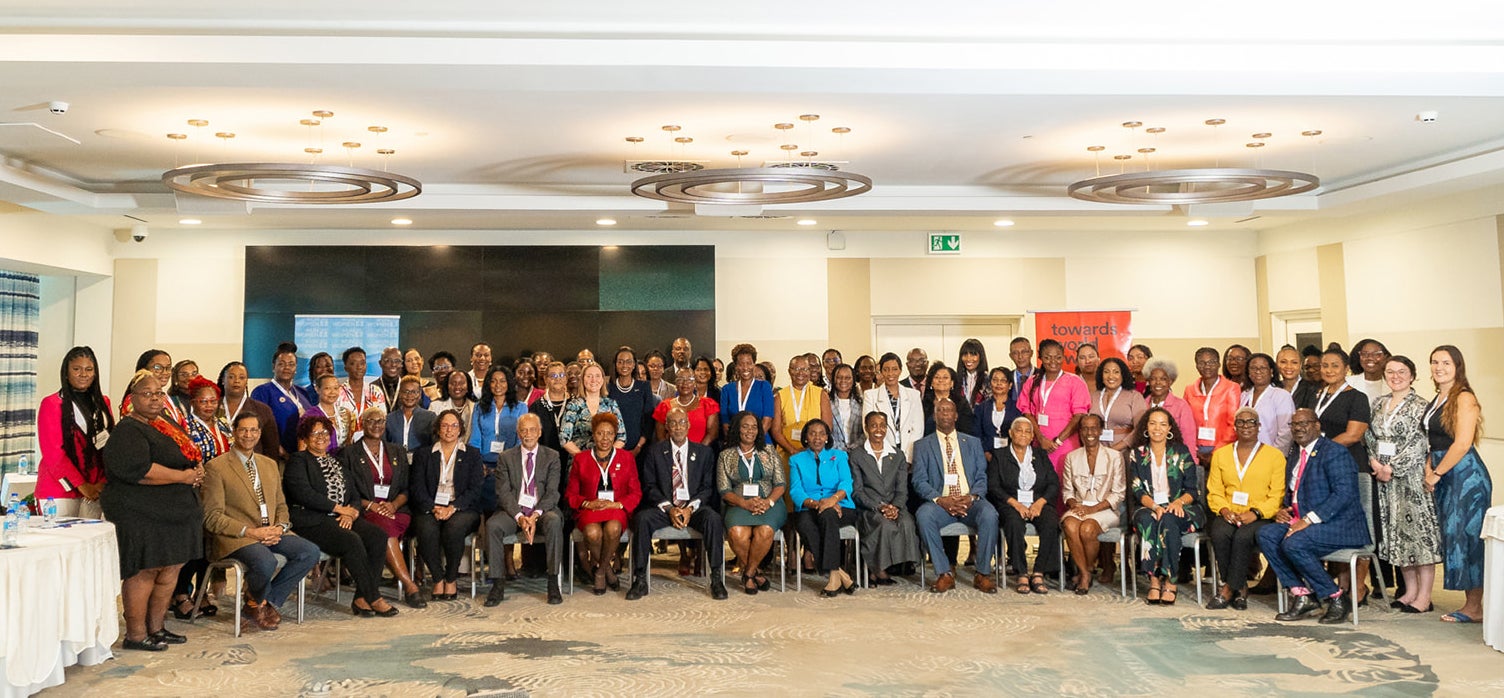Stronger Together: Propelling Sustainable Development, Gender Equality, and an End to Violence Against Women and Girls in the Caribbean - Joint Statement
Date:

We, parliamentarians, representatives of national gender machineries, civil society representatives, and experts from 17 Caribbean countries and territories, gathered in Gros Islet, Saint Lucia, for a multi-stakeholder dialogue on October 31-November 1, 2023, to consider the ways in which we can collaboratively advance the intrinsically interconnected objectives of inclusive and sustainable development, gender equality, and an end to violence against women and girls.
We recognise:
- That our region is committed to addressing our unique priorities as articulated in the Barbados Programme of Action, the Mauritius Strategy, the Bridgetown Initiative, and the SAMOA Pathway, all of which reaffirm that SIDS remain a special case for sustainable development, within the 2030 Agenda and its Sustainable Development Goals, and further reflected in Convention on the Elimination of All Forms of Discrimination Against Women (CEDAW) and the Inter-American Convention on the Prevention, Punishment, and Eradication of Violence against Women (the Belém do Para Convention) and its Follow-up Mechanism (MESECVI).
- That, despite progress towards gender equality – evidenced by the increase in women’s participation in the labour force, reduced gender gaps in schools, the creation and amendment of laws to protect women and the improvement of women’s representation in politics – gender inequality continues to be prevalent, reflected in disproportionate balances of unpaid care work, high rates of intimate partner violence and gender-based violence, especially violence against women and girls, the digital gender gap, unequal access to the labour market, substantial gender wage gap, other barriers to women’s economic empowerment, impunity for those who commit crimes against women and girls, and inadequate legal protection. 1
- That violence against women and girls is one of the most insidious and devastating forms of gender inequality and occurs at high levels: statistics reveal that 46% of women in the Caribbean region have experienced at least one form of violence in their lifetime, 2 representing an abject violation of human rights and freedoms that can result in immediate and long-term physical, psycho-social, economic, and/or health consequences, including the loss of life.
- That work towards ending gender inequality and violence against women and girls is also work towards sustainable development, and vice versa, given the ways in which inequalities hinder human, social, and economic development across the region. Further, gender inequality has costs that prevent resources from being allocated to other developmental issues: globally, violence against women and girls has an estimated cost of US $1.5 trillion. 3 4
- That addressing these complex realities in an inclusive, comprehensive, and sustainable manner requires strategic and coordinated action by actors in all spheres and sectors of society and requires genuine and durable partnership with government, private sector, civil society, and the media.
We, as stakeholders in defining and shaping the trajectory of the Caribbean region’s development, therefore commit to:
- Promoting the collection of data disaggregated by sex, race, ethnicity, disability, age, socioeconomic status, and geographic zone (rural-urban) on the various forms of gender-based violence, especially violence against women and girls, and gender analysis, dissemination, and use, to address the data gaps on this phenomenon and other related developmental issues, in order to guide the development of programs and interventions that are appropriately tailored to meet the needs of communities and countries.
- Designing and implementing effective and inclusive actions in our own realms, as well as in partnership with other actors, to address sustainable development issues, gender inequality, and violence against women and girls that draw on our knowledge of existing good, innovative, and evidence-based responses in place in the region and around the world, including Health and Family Life Education (HFLE).
- Utilizing our various platforms, networks, positions, and communication channels to strengthen public knowledge and raise consciousness on gender equality and violence against women and girls and amplify the calls for collaboration, unity, participation, and investment to address inequalities and promote sustainable development.
- Advocating for and contributing our expertise and voices to the development of inclusive national positions, as well as amplifying Indigenous voices and the voices of other vulnerable and marginalized groups, at the 4th SIDS Conference and other international fora on sustainable development issues in order to accomplish the SIDS Accelerated Modalities of Action (S.A.M.O.A.) Pathway, highlighting in particular how gender equality and women’s empowerment can be a catalyst to deliver on commitments related to: debt; access to sustainable finance; oceans and the blue economy; gender-responsive climate action, including comprehensive responses to economic and non-economic losses and damage, and just transitions; citizen security; and gender data and statistics.
- Calling for adequate allocations of resources, gender responsive budgeting, and increased accessibility of financing to ensure the effective implementation of commitments and actions related to gender equality, ending violence against women and girls, and sustainable development.
-
SDG Fact Sheet Latin America and the Caribbean, UN Women
-
Caribbean Women Count Ending Violence Against Women and Girls Data Hub, UN Women Caribbean
-
According to the UN Women Caribbean National Study on the Economic Costs of Violence Against Women and Girls in Jamaica Report, this cost is attributable to resource allocation to healthcare, police, justice and social welfare systems, and victim support services, as well as costs from unemployment, declines in wages and productivity, learning time lost, and harm to the well-being of VAWG survivors and their children.
-
The Economic Cost of Violence Against Women, UN Women (2016)